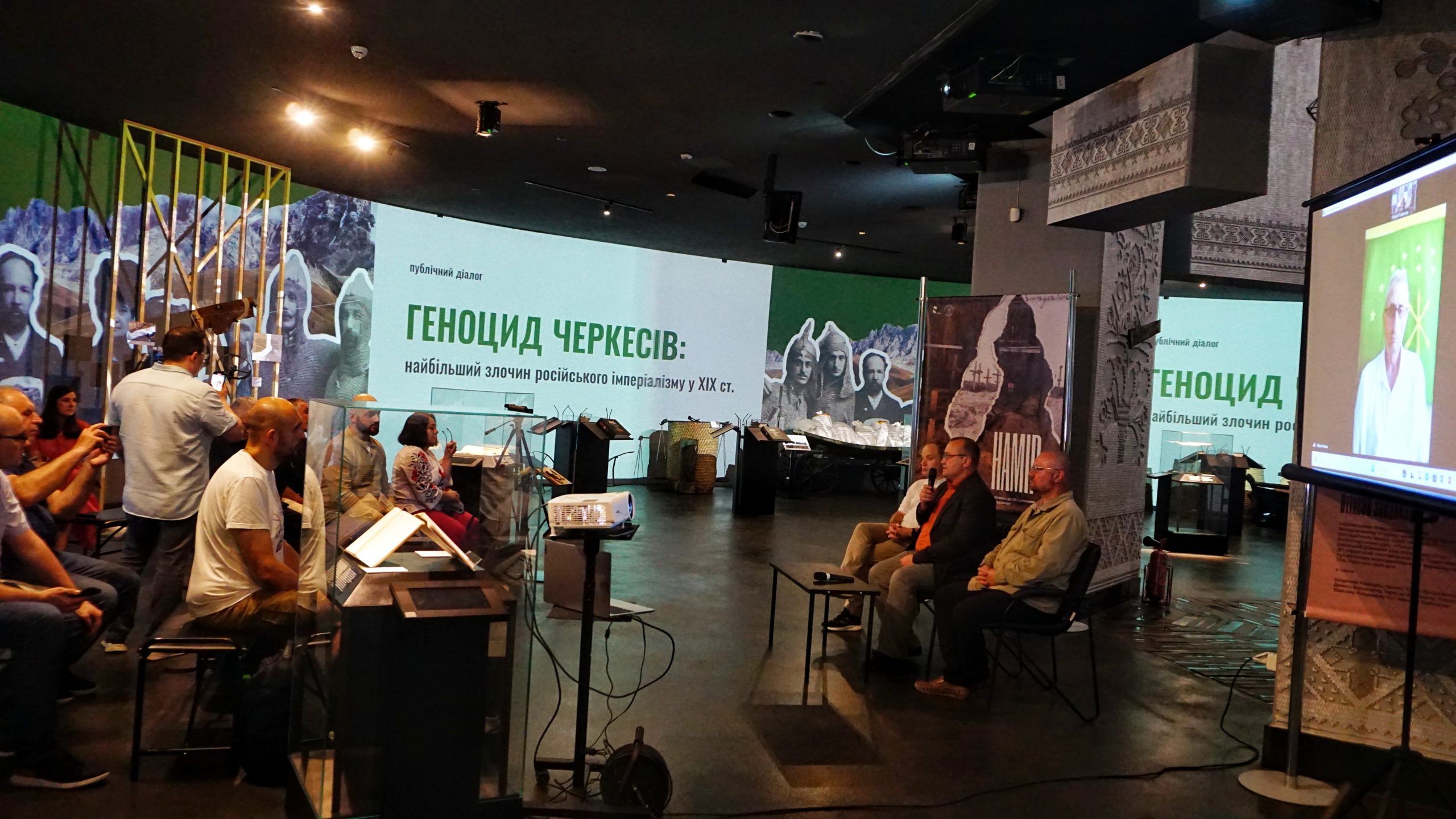A public dialogue about the Circassian genocide was held at the Holodomor Museum
On May 21, a public dialogue, “Circassian Genocide: The Greatest Crime of Russian Imperialism of the 19th Century,” was held at the Holodomor Museum. The date was chosen deliberately. On May 21, 1864, after the final major battle at Krasnaya Polyana near Sochi between Circassian warriors and Russian troops, the victory parade of the Russian army took place. It meant the colonisation of the region that forced the majority of the surviving people to leave their homeland and seek refuge in the Ottoman Empire.
“Today we are talking about the tragedy of the Circassian people – one of the most numerous in the Caucasus at the beginning of the 19th century. Ukrainians have long and strong ties with the Circassians: we can see this in the similarity of architecture, lifestyle and even individual words and geographical names. And some prominent figures of Ukrainian history had Circassian ancestors, for instance, some researchers believe that the surname of the Ukrainian Hetman Ivan Mazepa has Circassian origin. And it is not by chance that we remember those tragic events in the Holodomor Museum, because Russian imperialism used the tool of famine to destroy this people, in particular, “ Andrii Ivanets, the moderator of the event, and leading researcher of the Holodomor Museum said.
Ibrahim Yagan, the head of the Politrade of the “Free Cherkessia” movement and a member of the Politrade of the “Caucasian Union”, spoke about the current fate of the enslaved people. Mr Ibrahim is a political refugee and, at one time, was forced to leave the territory of his homeland, so he joined our event online.
“The pain of our people has not subsided to this day. Almost 90% of its representatives were destroyed or expelled from their native places. Many died as a result of the war and from the plague, introduced as a bacteriological weapon. The 10% of Circassians who remained in their historical homeland are now divided and concentrated in three reservations the Russian Empire allocated for our people. They are the Republic of Adygea, the Republic of Karachay-Cherkessia and the Republic of Kabardino-Balkaria. Our resistance has not stopped to this day. After all, all these years, the Russian Empire has been conducting a permanent genocide of the Caucasian peoples. The recent Chechen wars evidenced this, as well as counter-terrorism operations, which are ethnic cleansing among Caucasian peoples. The Russian Empire has also used the colonised peoples to subjugate other nations. And we can see this from the way Russia is waging a war in Ukraine: with the help of violent mobilisation, the Caucasian peoples are involved in this war, where they are being disposed of.”
Ibrahim Yagan emphasised that the liberation of the peoples of the Caucasus will guarantee the security of Ukraine itself, for which threats from the eastern Black Sea region will disappear.
About the history of the Circassians, or, as they call themselves, the Adyghes, and the history of their enslavement due to genocide, the head of the Holodomor Research Department of the National Museum of the Holodomor-Genocide, Professor, Doctor of Historical Sciences, Dmytro Bilyi, told. In particular, he shared interesting facts about the methods of warfare by Circassian warriors.
“The Circassians had iron rules of warfare, which they followed very strictly. In no case was it possible to trample crops, burn houses, ordestroy the environment. You can take prisoners, andfight, but you never burn forests, vineyards, buildings, trample rye. There are many testimonies about how the Circassians raided Katerynodar.They could have burned it down, but they did not do that because of the rule not to set people’s homes on fire, – Dmytro Bilyi says. – Russia’s methods were completely different! General von Zass, for example, was particularly cruel. He collected heads. He promised 10 rubles for each head. And so, when the battle ended, fights for heads began between Russian soldiers…” Years and centuries have passed, but we still see the same brutality and scorched-earth tactics in the Russian army today.
People’s Deputy of Ukraine Yaroslav Yurchyshyn emphasised the need to recognise and condemn the genocide of the Circassian people.
“Until the last genocide in the history of mankind is condemned, we will return to those crimes against humanity that we are currently seeing in Bucha, Izium, andMariupol. Because unpunished evil always returns, he noted. – Among the countries that have recognised the genocide of the Circassians, so far only Georgia. The Verkhovna Rada of Ukraine drafted a resolution recognising the genocide of the Circassian people. We are currently finalising the draft resolution. Soon, I hope, we will come to its final version. “In this resolution, we recognise and condemn the actions of Russia, regardless of its previous names – the Muscovite Empire, the Russian Empire, or the Soviet Union. It is the heir of those empires and must therefore take responsibility.”
Mr Yaroslav added that Ukrainian parliamentarians are also consulting with their partners from the Baltic countries and the USA because it is crucial that the decision to recognise this genocide is made not only at the Ukrainian level but also by other states.
Certificate. The Russo-Circassian War of 1763-1864 is a crucial part of one of the longest and most brutal colonial wars in history – the Russo-Caucasian. As a result of the long, aggressive actions of the Russian Empire, the peoples of the North Caucasus were conquered, and a large part of their representatives were destroyed or expelled from the Motherland.
